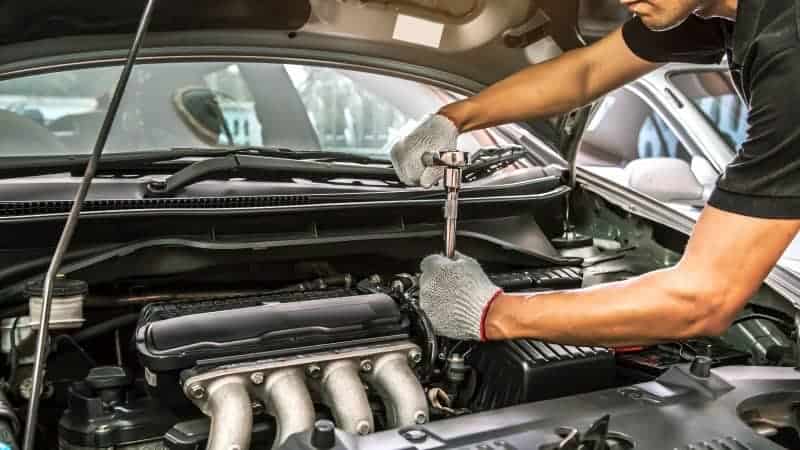When your car exhibits a jerking sensation during acceleration, and there’s no illuminated check engine light on the dashboard, it can be a perplexing and disconcerting issue. This phenomenon often leaves drivers wondering about the root cause of the problem.
While the absence of a check engine light suggests that the issue might not be immediately related to the engine’s emissions system, several potential factors could still be responsible for the jerking motion:
Top Reasons
If your car jerks when you accelerate, but the check engine light isn’t illuminated, it can be frustrating and puzzling. The absence of this warning light doesn’t mean there are no issues at play. Several underlying factors can cause your car to jerk during acceleration, making it imperative to diagnose and address the problem.
In this guide, we’ll explore some of the common culprits responsible for this jerking sensation, from transmission woes to fuel delivery problems and sensor malfunctions.
Understanding these potential causes can help you make informed decisions to restore smooth acceleration and ensure your vehicle’s optimal performance.
1. Transmission Troubles:
One of the most prevalent reasons is related to the transmission. When the transmission system experiences problems, it can lead to erratic power delivery to the wheels, causing the vehicle to jerk.
These problems may include low transmission fluid levels, a clogged transmission filter, or worn transmission components. These issues interrupt the smooth transfer of power from the engine to the wheels, resulting in the jerking sensation.
2. Fuel Delivery Issues:
Irregular fuel delivery is another common culprit for this problem. Issues such as clogged fuel filters, malfunctioning fuel pumps, or dirty fuel injectors can disrupt the consistent flow of fuel to the engine. When fuel delivery becomes inconsistent, it adversely affects engine performance, causing jerking as you accelerate.
These problems can be challenging to diagnose as they may not trigger a warning light on the dashboard, but they significantly impact the driving experience. Addressing fuel system problems is essential to restore smooth acceleration and overall vehicle performance.
3. Ignition System Problems:
The ignition system is critical for delivering power to the engine. When it malfunctions, it can lead to uneven power delivery, resulting in jerking during acceleration. Common ignition system problems include faulty spark plugs, ignition coils, or ignition timing.

These issues disrupt the combustion process, causing a noticeable disruption in your car’s performance. Even though these problems can be responsible for the jerking sensation, they may not always trigger the check engine light, making it essential to inspect and maintain the ignition system for optimal performance.
4. Vacuum Leaks:
Vacuum leaks can introduce unwanted air into the engine, leading to inconsistent engine performance and jerking during acceleration. These leaks disrupt the air-fuel mixture, causing combustion irregularities. Vacuum leaks can be elusive and challenging to detect, which is why they may not trigger a check engine light.
Proper diagnostics and repairs are necessary to address vacuum leaks and restore smooth acceleration and engine performance.
5. Air Intake Problems:
Issues within the air intake system, such as a clogged air filter or a malfunctioning mass airflow sensor, can impede the proper flow of air into the engine. When the air-fuel mixture is not optimal, it can result in jerking during acceleration.
These issues can affect engine performance, even without illuminating the check engine light. Regular maintenance of the air intake system is essential to ensure consistent and smooth engine operation.
6. Faulty Sensors:
Several sensors in your vehicle monitor various aspects of engine performance. Malfunctioning sensors, such as the oxygen sensor or throttle position sensor, can disrupt the engine’s operation, leading to jerking during acceleration.
These sensor-related problems may not always manifest as check engine light warnings but can significantly impact your driving experience. Proper inspection and maintenance of these sensors are crucial for maintaining engine performance and preventing jerking issues.
7. Engine Misfires:
Engine misfires can occur without triggering the check engine light. Misfiring cylinders can lead to jerking sensations as the power delivery becomes uneven. Diagnosing and resolving these misfires is crucial for a smoother and more reliable ride.
Engine misfires can result from various issues, including spark plug problems, fuel delivery irregularities, or ignition system malfunctions. Identifying the root cause of misfires and addressing them promptly is essential to eliminate jerking during acceleration and restore consistent engine performance.
8. Worn Motor Mounts:
Damaged or worn-out motor mounts can allow excessive engine movement during acceleration, leading to jerking. Motor mounts play a vital role in stabilizing the engine and reducing vibrations. When they deteriorate, the engine’s movement becomes less controlled, resulting in an unsettling sensation during acceleration.

While worn motor mounts may not trigger a check engine light, they can significantly impact your driving experience. Replacing or repairing motor mounts is essential to restore engine stability and eliminate jerking issues.
9. Exhaust System Issues:
Although primarily related to the exhaust system, issues like a restricted or clogged exhaust system can significantly affect engine performance and cause jerking during acceleration. Problems may arise from a blocked catalytic converter or a damaged muffler, which can disrupt the flow of exhaust gasses.
When the exhaust system is compromised, it affects the engine’s ability to expel exhaust efficiently, resulting in jerking. Proper maintenance and timely repairs of the exhaust system are necessary to ensure smooth acceleration and overall vehicle performance.
10. Dirty or Faulty Mass Airflow Sensor:
The mass airflow sensor measures the amount of air entering the engine and adjusts the fuel mixture accordingly. If this sensor is dirty or malfunctioning, it can cause jerking during acceleration. A dirty mass airflow sensor can inaccurately measure incoming air, leading to an imbalanced air-fuel mixture.
The result is uneven power delivery, which is felt as jerking. Ensuring the mass airflow sensor is clean and functioning correctly is crucial for maintaining optimal engine performance. Regular inspection and cleaning can prevent jerking issues and help your vehicle run smoothly during acceleration.
How To Fix?
Fixing a car that jerks when accelerating light involves a systematic approach to identify and address the underlying issues. Here’s a step-by-step guide to help you resolve this problem:
Check Transmission Fluid:
Ensure that your vehicle has the appropriate level of transmission fluid. Low transmission fluid can lead to jerking during acceleration. If it’s low, top it up with the recommended type of transmission fluid, as specified in your vehicle’s owner’s manual.
Transmission Inspection:

If adding transmission fluid doesn’t solve the problem, or if you notice burnt or discolored fluid, consult a professional mechanic. They can inspect the transmission system for any damage, clogged filters, or worn components.
Fuel System Check:
Inspect the fuel system for issues like clogged fuel filters, a malfunctioning fuel pump, or dirty fuel injectors. Replace the fuel filter if it’s clogged and consider professional fuel system cleaning if needed.
Ignition System Maintenance:
Regularly replace spark plugs (if necessary) and inspect ignition coils. Correct any timing issues if they are detected.
Vacuum System Inspection:
Check for vacuum leaks in the engine. These leaks can disrupt the air-fuel mixture. If leaks are found, repair or replace the affected components.
Air Intake System:
Ensure that the air filter is clean and functioning correctly. Clean or replace it if necessary. Check the mass airflow sensor for any dirt or malfunctions.
Top FAQ
Can I continue driving if my car jerks occasionally during acceleration?
If the jerking is infrequent and doesn’t affect your safety or driving experience, you can continue driving. However, it’s advisable to have the issue diagnosed and fixed to prevent it from worsening.
Can a dirty air filter cause jerking during acceleration?
Yes, a dirty air filter can disrupt the air-fuel mixture and lead to jerking during acceleration. Regular air filter maintenance can help prevent this issue.
How can I check for vacuum leaks in my car’s engine?
You can visually inspect vacuum hoses for cracks or loose connections. Alternatively, you can use a smoke machine, which is a more precise way to detect vacuum leaks. A mechanic can also perform a smoke test.
What’s the role of the mass airflow sensor in jerking during acceleration?
The mass airflow sensor measures incoming air for the engine to adjust the fuel mixture. A malfunctioning or dirty sensor can disrupt this mixture, leading to uneven power delivery and jerking.
Final Thought
In short, addressing this issue promptly can lead to a smoother and safer driving experience.
Don’t ignore these symptoms, as they could be indicative of underlying problems that need attention. Take action to keep your car running smoothly and enjoy the open road with confidence.


